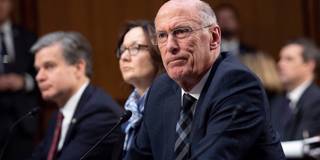Many partisans accused President George W. Bush of lying and pressuring the intelligence community to produce intelligence to justify a war that Bush had already chosen. But the situation was complicated, and to understand the problems of speaking truth to power, we must clear away the myths.
CAMBRIDGE – US President Donald Trump’s nomination of John Ratcliffe, a highly partisan Congressman with little international experience, to replace Dan Coats as Director of National Intelligence raised the red flag of the politicization of intelligence. Opposition to Ratcliffe among Democrats and Republicans alike forced Trump to withdraw the nomination, but the question remains: Will power corrupt truth? Presidents need an intelligence director they can trust, but can the rest of the government trust that director to speak truth to power, as Coats did when he contradicted the president on issues like Russia, Iran, and North Korea?
Costly intelligence failures are not unique to the United States. France failed to foresee Germany’s attack through the Ardennes in 1940; Stalin was blindsided by Hitler’s attack in 1941; and Israel was surprised by the Yom Kippur War in 1973.
Trump, who is angry at the US intelligence services for pointing out the degree of Russian interference in his 2016 election, often justifies his dismissal of their work by referring to their inaccurate assessment that Iraq possessed weapons of mass destruction. Many partisans accused President George W. Bush of lying and pressuring the intelligence community to produce intelligence to justify a war that Bush had already chosen. But the situation was complicated, and to understand the problems of speaking truth to power, we must clear away the myths.

CAMBRIDGE – US President Donald Trump’s nomination of John Ratcliffe, a highly partisan Congressman with little international experience, to replace Dan Coats as Director of National Intelligence raised the red flag of the politicization of intelligence. Opposition to Ratcliffe among Democrats and Republicans alike forced Trump to withdraw the nomination, but the question remains: Will power corrupt truth? Presidents need an intelligence director they can trust, but can the rest of the government trust that director to speak truth to power, as Coats did when he contradicted the president on issues like Russia, Iran, and North Korea?
Costly intelligence failures are not unique to the United States. France failed to foresee Germany’s attack through the Ardennes in 1940; Stalin was blindsided by Hitler’s attack in 1941; and Israel was surprised by the Yom Kippur War in 1973.
Trump, who is angry at the US intelligence services for pointing out the degree of Russian interference in his 2016 election, often justifies his dismissal of their work by referring to their inaccurate assessment that Iraq possessed weapons of mass destruction. Many partisans accused President George W. Bush of lying and pressuring the intelligence community to produce intelligence to justify a war that Bush had already chosen. But the situation was complicated, and to understand the problems of speaking truth to power, we must clear away the myths.